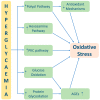Oxidative Stress in Type 2 Diabetes: Impacts from Pathogenesis to Lifestyle Modifications
- PMID: 37623239
- PMCID: PMC10453126
- DOI: 10.3390/cimb45080420
Oxidative Stress in Type 2 Diabetes: Impacts from Pathogenesis to Lifestyle Modifications
Abstract
Oxidative stress is a critical factor in the pathogenesis and progression of diabetes and its associated complications. The imbalance between reactive oxygen species (ROS) production and the body's antioxidant defence mechanisms leads to cellular damage and dysfunction. In diabetes, chronic hyperglycaemia and mitochondrial dysfunction contribute to increased ROS production, further exacerbating oxidative stress. This oxidative burden adversely affects various aspects of diabetes, including impaired beta-cell function and insulin resistance, leading to disrupted glucose regulation. Additionally, oxidative stress-induced damage to blood vessels and impaired endothelial function contribute to the development of diabetic vascular complications such as retinopathy, nephropathy, and cardiovascular diseases. Moreover, organs and tissues throughout the body, including the kidneys, nerves, and eyes, are vulnerable to oxidative stress, resulting in diabetic nephropathy, neuropathy, and retinopathy. Strategies to mitigate oxidative stress in diabetes include antioxidant therapy, lifestyle modifications, and effective management of hyperglycaemia. However, further research is necessary to comprehensively understand the underlying mechanisms of oxidative stress in diabetes and to evaluate the efficacy of antioxidant interventions in preventing and treating diabetic complications. By addressing oxidative stress, it might be possible to alleviate the burden of diabetes and improve patient outcomes.
Keywords: Mediterranean diet; diabetes complications; diet; lifestyle modifications; oxidative stress; physical activity; type 2 diabetes.
Conflict of interest statement
The authors declare no conflict of interest.
Figures



References
-
- Saeedi P., Petersohn I., Salpea P., Malanda B., Karuranga S., Unwin N., Colagiuri S., Guariguata L., Motala A.A., Ogurtsova K., et al. IDF Diabetes Atlas Committee. Global and regional diabetes prevalence estimates for 2019 and projections for 2030 and 2045: Results from the International Diabetes Federation Diabetes Atlas, 9th edition. Diabetes Res. Clin. Pract. 2019;157:107843. doi: 10.1016/j.diabres.2019.107843. - DOI - PubMed
-
- Salvatore T., Galiero R., Caturano A., Vetrano E., Rinaldi L., Coviello F., Di Martino A., Albanese G., Colantuoni S., Medicamento G., et al. Dysregulated Epicardial Adipose Tissue as a Risk Factor and Potential Therapeutic Target of Heart Failure with Preserved Ejection Fraction in Diabetes. Biomolecules. 2022;12:176. doi: 10.3390/biom12020176. - DOI - PMC - PubMed
Publication types
LinkOut - more resources
Full Text Sources

